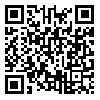Thu, Feb 19, 2026
[Archive]
Volume 2, Issue 4 (Summer 2024)
CPR 2024, 2(4): 259-270 |
Back to browse issues page
Download citation:
BibTeX | RIS | EndNote | Medlars | ProCite | Reference Manager | RefWorks
Send citation to:



BibTeX | RIS | EndNote | Medlars | ProCite | Reference Manager | RefWorks
Send citation to:
Abedian Kasgari K, Aghaei N. The Needs and Problems of Bereaved Families in Hospitals: Perspectives of the Bereaved Families and Medical Staff. CPR 2024; 2 (4) :259-270
URL: http://cpr.mazums.ac.ir/article-1-140-en.html
URL: http://cpr.mazums.ac.ir/article-1-140-en.html
Sexual and Reproductive Health Research Center, Mazandaran University of medical sciences, Sari, Iran. & Department of Medical Surgical Nursing, Faculty of Nursing and Midwifery, Mazandaran University of Medical Sciences, Sari, Iran.
Abstract: (603 Views)
Background and Objective: The present study aims to explore the needs and problems of the bereaved families in hospitals from the perspectives of bereaved families and medical staff.
Materials & Methods: This is a descriptive cross-sectional study on 257 medical staff working in teaching/medical hospitals in Sari, north of Iran, affiliated with Mazandaran University of Medical Sciences, who were in direct contact with bereaved companions from the admission stage to discharge and 102 bereaved family members who had lost a loved one in these hospitals in the past year. The sampling method was census. The data collection tools were a demographic checklist and two researcher-made questionnaires to survey the needs and problems from the perspective of medical staff and bereaved relatives. The collected data were analyzed in SPSS software, version 22 using descriptive and analytical tests (Mann-Whitney U, Kruskal-Wallis, and Spearman’s correlation).
Results: More than 90% of the medical staff stated that there was a need for a separate unit in the hospital for the decedent affairs and a bereavement room for bereaved families. More than 70% of the medical staff considered the presence of first-degree relatives and a chaplain in the final hours of the patient’s life, and the greatest dissatisfaction of bereaved families was the lack of a guide for the discharge of the deceased person, and the difficulty in finding an ambulance for discharge. More than 90% of bereaved families agreed that a separate unit was needed in the hospital to deal with the affairs of the deceased person. About 94% of bereaved families mentioned the need for transportation services in the discharge unit. More than 90% of bereaved families needed to be in the ward during the patient’s final moments. More than 90% of bereaved families stated that the medical staff treated the bereaved families and the deceased person appropriately.
Conclusion: Both bereaved families and medical staff identified welfare-related needs and problems as the most important ones. It is recommended that hospitals create a bereavement room and a separate gathering hall for bereaved families, and pay special attention to communication skills, especially in the field of bereavement care, in specialized training programs for medical staff.
Materials & Methods: This is a descriptive cross-sectional study on 257 medical staff working in teaching/medical hospitals in Sari, north of Iran, affiliated with Mazandaran University of Medical Sciences, who were in direct contact with bereaved companions from the admission stage to discharge and 102 bereaved family members who had lost a loved one in these hospitals in the past year. The sampling method was census. The data collection tools were a demographic checklist and two researcher-made questionnaires to survey the needs and problems from the perspective of medical staff and bereaved relatives. The collected data were analyzed in SPSS software, version 22 using descriptive and analytical tests (Mann-Whitney U, Kruskal-Wallis, and Spearman’s correlation).
Results: More than 90% of the medical staff stated that there was a need for a separate unit in the hospital for the decedent affairs and a bereavement room for bereaved families. More than 70% of the medical staff considered the presence of first-degree relatives and a chaplain in the final hours of the patient’s life, and the greatest dissatisfaction of bereaved families was the lack of a guide for the discharge of the deceased person, and the difficulty in finding an ambulance for discharge. More than 90% of bereaved families agreed that a separate unit was needed in the hospital to deal with the affairs of the deceased person. About 94% of bereaved families mentioned the need for transportation services in the discharge unit. More than 90% of bereaved families needed to be in the ward during the patient’s final moments. More than 90% of bereaved families stated that the medical staff treated the bereaved families and the deceased person appropriately.
Conclusion: Both bereaved families and medical staff identified welfare-related needs and problems as the most important ones. It is recommended that hospitals create a bereavement room and a separate gathering hall for bereaved families, and pay special attention to communication skills, especially in the field of bereavement care, in specialized training programs for medical staff.
Type of Study: Research |
Subject:
Psychology
Received: 2025/04/24 | Accepted: 2025/09/19 | Published: 2025/09/19
Received: 2025/04/24 | Accepted: 2025/09/19 | Published: 2025/09/19
Send email to the article author
| Rights and permissions | |
 |
This work is licensed under a Creative Commons Attribution-NonCommercial 4.0 International License. |







